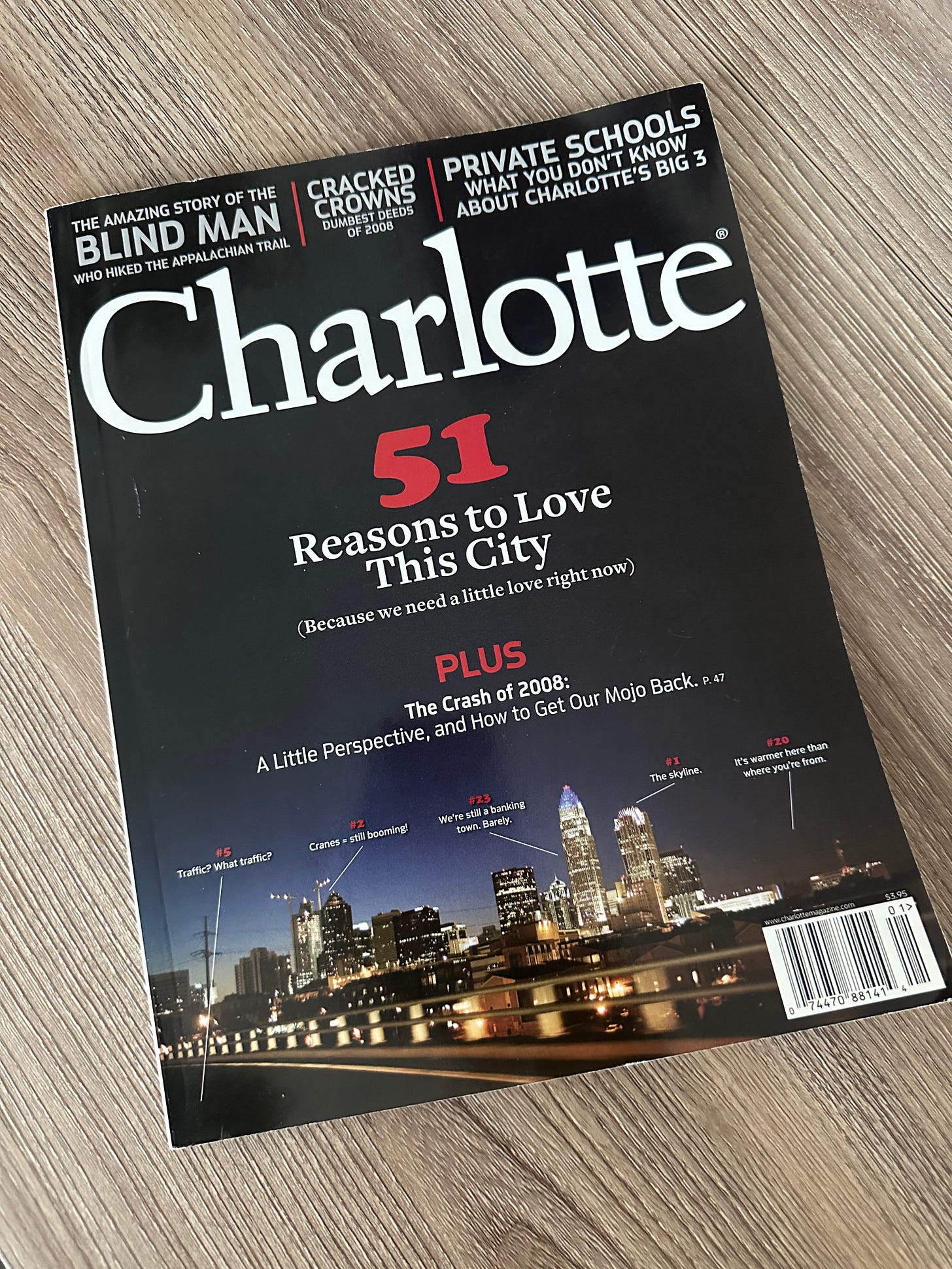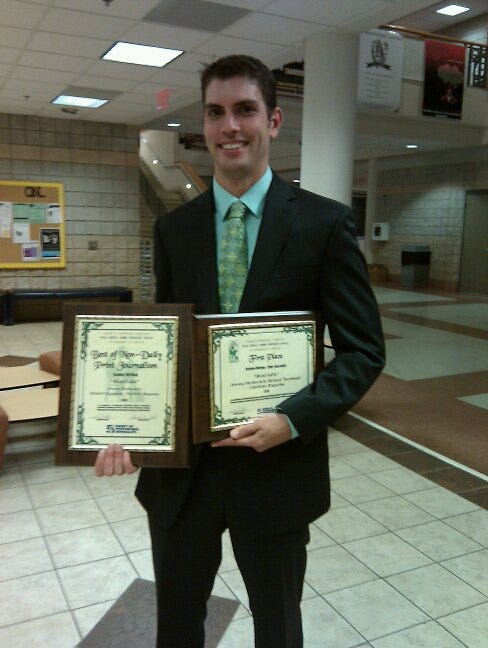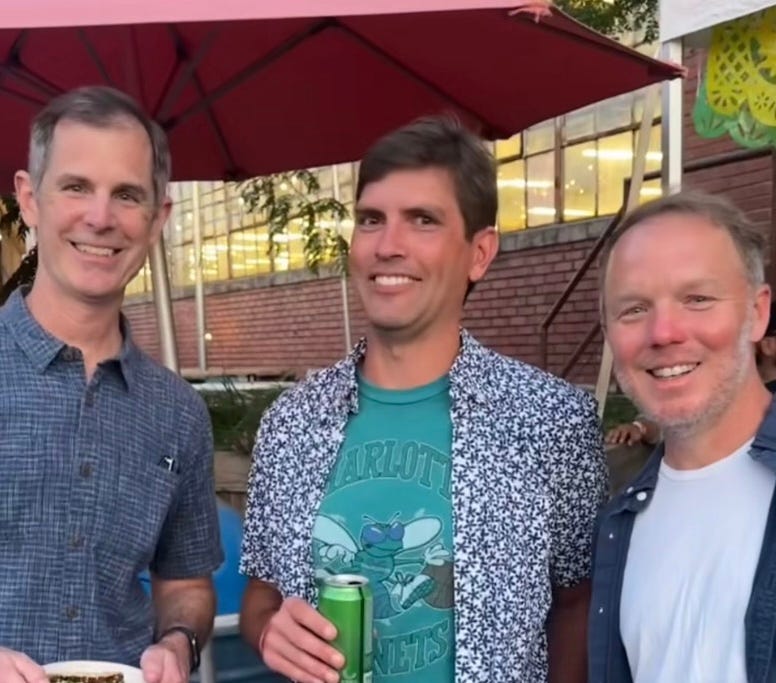Pour one out for Charlotte magazine
The publication that gave me a shot to be a writer is shutting down.
On a warm fall day in October 2008, I heard a radio interview that would change my life.
I was driving to my job as a newscast producer at a TV station in Charlotte when the morning host on WFAE radio started talking to Trevor Thomas about his successful 2,175 mile hike of the Appalachian Trail.
Trevor was blind. I was riveted.
I walked into the morning editorial meeting that day and pitched the story. Here was a guy who couldn’t see! And somehow, he’d walked from Georgia to Maine. He lived in Charlotte. I’d already looked up his address and phone number. It seemed like a slam dunk.
My bosses passed on it.
So, the next day. I pitched it again. They passed again. I tried a few more times, but nothing happened. I checked other TV stations and the Charlotte Observer, certain that someone else was going to pick up the story and run with it. That didn’t happen.
I called up Trevor and asked if I could meet him for lunch. Over a meal, he told me how he’d lost his eyesight. He went into detail about his depression, his saving grace, and his decision to hike. He churned out story after story about the trail. At the end, he asked me who I was writing for. I don’t know, I told him.
I felt like I had a story, but my day job wouldn’t let me run with it. After all, I wasn’t a TV reporter who could commandeer a camera and do it on my own time. Maybe, I thought, I could write something. I remembered a name: Rick Thurmond. He was the editor at Charlotte magazine, and I’d once pitched him an essay about riding the brand new light rail line when it opened in 2007. Rick said no (it didn’t have enough of a shelf life to work in print), but told me to pitch him again. So, in October 2008, I did. I’ve never written a magazine story before, I told him. But I have a good one, and I’m a TV journalist, so I’m not crazy, and maybe I could write something up for you?
Rick got back to me. Yeah, he said, let’s go for it.
In the weeks afterward, I went on a hike with Trevor, scraped the entire internet for news stories and message board entries about his hike, found people who had walked part of the AT with him, and made phone call after phone call. A month later, I sent Rick a 5,700 word draft. “I think you did a terrific job with this story,” he emailed back. “I’m going to be proud to publish it in Charlotte magazine.” I was giddy.
That story, “Blind Faith,” was my first print byline since my high school newspaper. I rushed out in January 2009 to find Charlotte magazine on the newsstand. There was my story, listed right there on the top of the cover.
I still had no idea if I’d done a good job. I mean, Rick said I did, and he seemed like a nice guy, but I had no real sense of what I’d written. A year later in March 2010, Rick emailed me a press release that said I’d been nominated for a National City and Regional Magazine Award. Wow, I thought. This is a big deal! (With the benefit of hindsight, I’ll say that a bigger deal happened two days later when I fetched coffee for They Might Be Giants in the morning and met my future wife over a board game in the evening).
A few months later, I found out I’d won. Later, I tried to impress my new girlfriend by inviting her to take a trip to suburban Atlanta with me for a ceremony for a different award for the same story. The event was held in a small multipurpose room at Kennesaw State University (which was not impressive), but luckily I won two Green Eyeshade Awards that night (which was).
By that time, Rick and I had start pitching stories to each other. I started writing about taquerias, Olde Mecklenburg beer, forensic nurses, a rent-a-friend service, and a 15-year-old who was impersonating a Charlotte Bobcat on Twitter. In late 2010, the two guys who ran a beloved dive bar in Plaza Midwood got the boot. People were furious. The saga at The Penguin became a simmering local controversy. Rick emailed me and asked me if I wanted to write about it. “It has all the makings of a classic city magazine story, and I think you’d be the perfect person to tell it,” he wrote. “You interested?”
I spent the next two months taking trips after work to Plaza Midwood, talking to everyone who knew anything about what happened at The Penguin. The ensuing story, “Frayed Pride and Fried Pickles,” came out in March 2011.
Someone at Our State magazine read the story and asked if I would consider freelancing for them. So, I started writing for Our State, and met an editor there named Mike Graff. Mike was patient, thoughtful, talented, and direct, much like Rick. Naturally, when Rick was promoted to publisher, Mike applied for and got the job as Charlotte magazine’s editor. By this time, I’d become the back page columnist for the magazine, largely because I’d started pestering Rick to write blogs where I presented very serious city-level insights like “Consensus: Somewhere Between Nipples and Streetcars” and “The Most Awkward Hug Ever, Looping For Your Analysis.” I said Marshall Park was an “angry urban poop-scape” and stated, confidently, that “Yo Mama’s So Ugly, She’s Greensboro” (that one would come back to bite me). But I was also writing serious stuff too. I spent 24 hours riding along with the busiest firefighters in Charlotte. I wrote about NASCAR’s return to Rockingham. I wrote about the surprisingly serious young guys who were behind a movement to get the Charlotte Bobcats to change their name to the Hornets.
The more I wrote for Charlotte magazine, the more my writing world began to grow. In 2013, Mike introduced me to Glenn Stout, who was editing SB Nation’s burgeoning longform section at the time. That led to a story about the life of NASCAR driver Dick Trickle that put my writing in an actual damn book. I got to know
, who recommended me to the folks at CBS Sports. That site let me use thousands of words to vent about the Cleveland Browns and to explore my skepticism about Jim Tressel as a university president. Michael Kruse, formerly a newspaper reporter and fellow Charlotte magazine contributor, connected me to his editor at Politico, and I wrote about Nikki Haley, a 5K race about gerrymandering, and a Memphis climbing gym created by the dude who directed “Ace Ventura: Pet Detective.” Charlotte magazine alums connected me with editors of an alumni magazine at Wharton and folks looking for graduate profiles at the Stanford Business School.Through it all, though, I kept writing and blogging for Charlotte magazine. It had become my home.
I was doing all of this on top of my day job as a producer at WCNC-TV, which had become much less satisfying, especially after some internal shuffling and ownership changes. After my son was born, my calculations began to change. In 2015, the folks at Our State contacted me about an opening for a senior writer and editor, which would allow me to write full time and move to the Greensboro area to be close to my wife’s parents. We made the change, and I was thrilled about the opportunity, but it came with a cost. I had to leave Charlotte, and Charlotte magazine, behind.
I’m writing all of this because Charlotte magazine is shutting down. I don’t know all of the details, but The Charlotte Ledger reported that contributors started hearing last week that their services would no longer be needed. The news came as a shock to, well, everybody. I’ve talked to a bunch of folks within the Charlotte magazine orbit over the last few days, and while I can’t tell you exactly what the parent company, Morris Communications, was thinking (an announcement is allegedly coming tomorrow?), it doesn’t seem to be an orderly wind down of things. Tommy has written already about what Charlotte magazine meant to the city. I’m sure Mike Graff is going to talk about it in his newsletter tonight.
But here’s the one thing you should know about this news: It sucks. My friends Andy Smith and Greg Lacour have consistently worked their asses off over the years, were rewarded by becoming publisher and editor, respectively, and now are going to be out of a job. There are so many alumni—Lisa Rab, Jen McGivney, Adam Rhew, Matt Crossman, Jarvis Holliday, Sarah Crosland, Jenn Grabenstetter, Logan Cyrus, Travis Dove, and many, many more—who I now consider to be friends. I always knew that whatever I wrote was always going to be in good company in those pages. Charlotte itself, which admittedly has a wealth of media outlets, is losing a perspective that’s going to be impossible to replace.
Magazines don’t get enough respect. People rightly bemoan the loss or hollowing out of local newspapers and alt-weeklies, which provide a steady drip of factual information that help you navigate your community. On the other end, there’s nothing like a book to help you truly understand something, even though the desire and ability to read something deeply seems to be fading for the next generation. In between are magazines. Because they arrive monthly, they can’t rapidly report on the news of the day. But they’re not books, which can take a year or more for an author to generate. They’re in the middle. They can provide analysis when it’s sorely needed. They can tell stories that, structurally, don’t make sense for others to tell. The front of book, as it’s called, is full of short articles about food, culture, life, history, and more. The feature well is where a city can work out its issues. There’s nothing quite like a 2,000+ word magazine story. It’s long enough to give you depth, emotion, and meaning. It’s short enough for you to finish in one sitting.
Hence, Charlotte magazine (and Matt Crossman) gave you an oral history of the 1988 Charlotte Hornets. It gave you a civil rights hero you’d never heard of. It gave you a heartbreaking story about the loss of a dog that would go on to form the basis of a book. It gave you a profile of early Thom Tillis, a politician on the rise who knew how to mess with the head of a writer by bringing up the name of his dog. It delved into the infamous Tim Richmond poster. It once challenged a writer to drink a 166 ounce Moscow Mule. It cast a thoughtful gaze on politics. On the growing pains of a rapidly expanding city. Every month, it asked the same question: What’s it like to be a Charlottean?
I never actually worked at Charlotte magazine. I was always a freelancer. But I gave six years of my life to it, figuring out how to write and work with editors who took care of me. They often saved me from myself. In return, I just wanted to know how I could help. Getting a check from them was a nice thing, but I never really did it for the money. Charlotte magazine gave me a shot, and I spent years of my life trying to return the favor.
Even after I moved on, I still infused my Charlotte magazine sensibility into everything I did. When I got stuck on a story, I’d hear Rick Thurmond asking me: Can you boil this whole thing down to one word? Isn’t that what this story’s about? Or, I’d hear Graff calmly speaking a version of: I like this, but I think you can do better. My years at Our State gave me a chance to understand the rest of North Carolina, although the nature of that magazine—celebratory and glossy—made it hard to write cynically and openly about the gritty sides of the state that I’d encountered. When I started a podcast there, I leaned on the voice that I’d been able to hone at Charlotte magazine. When I created the North Carolina Rabbit Hole, it was like I was restarting my Way Out column and blog. Writing for Charlotte made me and countless others ready for the current media moment. It gave us the skills to dig and report, the space to write thoughtfully, and confidence to speak in our own voice.
After a long gap, my byline popped up one final time in Charlotte magazine in 2021. Greg Lacour asked me to write an essay about Marty Schottenheimer, a former Cleveland Browns coach who’d moved to Lake Norman and was entering hospice. The story wasn’t so much about Schottenheimer the man. Instead, Greg allowed me to explore the nature of my own personal nostalgia.
My personal nostalgia for Charlotte magazine is always going to be sunnier than the daily reality of a magazine whose owners seemed to be absentee at best. I never had to negotiate a budget. I never had to make a business decision. Instead, I got to work with people who cared enough about their city and their craft to make a magazine that was better than it had any right to be. I, like so many writers and readers, got to experience Charlotte magazine on its best terms. The last line of the last thing I wrote there sums up the memory I have of that time and place: “It allows me to trick myself and escape, for a moment, back to a time when things were no less complicated or hard but sure felt like they were.”






Aw man! I’m going to miss the magazine.
BTW I read your story about the fire fighters. My dad spent his career with the Charlotte Fire Department. They’ll always have a special place in my heart. ❤️
Every morning I miss thumbing through the paper, and now there's one more hole in the print media-scape. Thanks for sharing the memories, Jeremy!